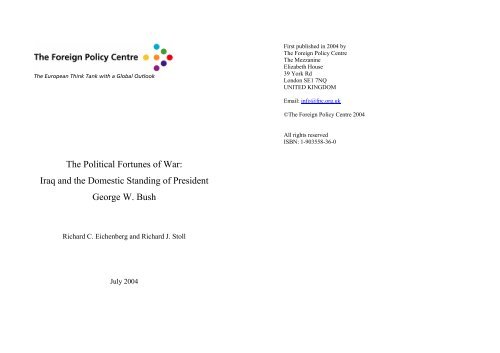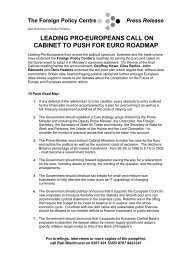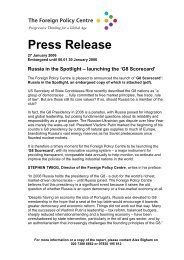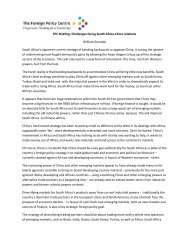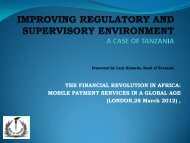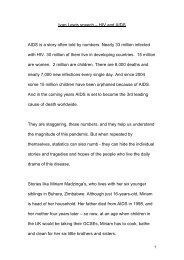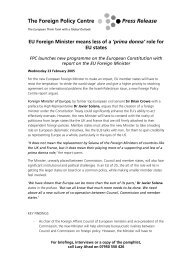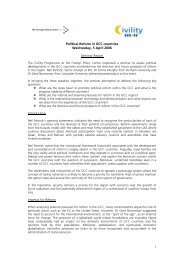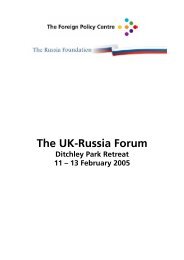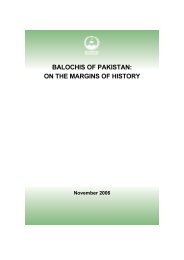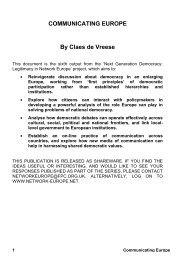The Political Fortunes of War - Foreign Policy Centre
The Political Fortunes of War - Foreign Policy Centre
The Political Fortunes of War - Foreign Policy Centre
Create successful ePaper yourself
Turn your PDF publications into a flip-book with our unique Google optimized e-Paper software.
<strong>The</strong> European Think Tank with a Global Outlook<br />
<strong>The</strong> <strong>Political</strong> <strong>Fortunes</strong> <strong>of</strong> <strong>War</strong>:<br />
Iraq and the Domestic Standing <strong>of</strong> President<br />
George W. Bush<br />
Richard C. Eichenberg and Richard J. Stoll<br />
July 2004<br />
First published in 2004 by<br />
<strong>The</strong> <strong>Foreign</strong> <strong>Policy</strong> <strong>Centre</strong><br />
<strong>The</strong> Mezzanine<br />
Elizabeth House<br />
39 York Rd<br />
London SE1 7NQ<br />
UNITED KINGDOM<br />
Email: info@fpc.org.uk<br />
©<strong>The</strong> <strong>Foreign</strong> <strong>Policy</strong> <strong>Centre</strong> 2004<br />
All rights reserved<br />
ISBN: 1-903558-36-0
About the Authors<br />
Richard C. Eichenberg is Associate Pr<strong>of</strong>essor <strong>of</strong> <strong>Political</strong> Science at Tufts<br />
University and a former Director <strong>of</strong> the Tufts International Relations<br />
Program. He has held fellowships and grants from the Ford Foundation,<br />
Harvard University, and the Social Science Research Council. His books<br />
and articles have concerned public opinion and national security in the<br />
United States and Western Europe. His paper on the gender gap in<br />
American attitudes toward national security won the Prize <strong>of</strong> the <strong>Foreign</strong><br />
<strong>Policy</strong> Section <strong>of</strong> the American <strong>Political</strong> Science Association for the best<br />
paper presented at the 2002 convention. He is now at work on a book on<br />
public opinion and national security in the US, Europe and around the<br />
globe, tentatively entitled Defense in Democracies: Public Opinion on<br />
National Security and Why It Matters.<br />
Richard J. Stoll is Pr<strong>of</strong>essor <strong>of</strong> <strong>Political</strong> Science and Associate Dean <strong>of</strong><br />
Social Sciences at Rice University in Houston, Texas. His research interests<br />
include the study <strong>of</strong> international conflict and American national security<br />
policy. His most recent published work includes studies <strong>of</strong> Samuel<br />
Huntington's Clash <strong>of</strong> Civilizations (with Sean Bolks) and predicting public<br />
support for defense spending and changes in defense spending in five<br />
western countries (with Richard C. Eichenberg). He is currently engaged in<br />
a multi-year project that seeks to predict the onset <strong>of</strong> international conflict<br />
from computer-generated events data.<br />
Acknowledgements<br />
<strong>The</strong> authors are grateful to James Stimson and Christopher Wlezien for<br />
helpful suggestions on the manuscript.<br />
ABSTRACT<br />
This paper provides a preliminary quantitative assessment <strong>of</strong> just how much<br />
the Iraq war may be costing President Bush in his bid for re-election. <strong>The</strong><br />
assessment is made against the background <strong>of</strong> several sets <strong>of</strong> polling<br />
results, but is referenced in particular to historical data on the correlation<br />
between a President’s popularity or approval ratings over the course <strong>of</strong> his<br />
first term and the result <strong>of</strong> the election that would give him a second term.<br />
Incumbent presidents who win re-election have generally enjoyed approval<br />
ratings in their fourth year <strong>of</strong> <strong>of</strong>fice <strong>of</strong> almost 60 percent. <strong>The</strong> approval<br />
rating <strong>of</strong> losers has been below 50 percent.<br />
Our main finding is that American casualties in the Iraq war have had a<br />
measurable negative impact on the President’s job approval rating.<br />
Specifically, Bush’s job approval rating has declined by just over 1 percent<br />
for every 100 deaths <strong>of</strong> American service personnel. Using this estimate,<br />
the war may have cost the president over 10 percent in his job approval<br />
ratings.<br />
As <strong>of</strong> June 2004, the average <strong>of</strong> all approval polls for President Bush was<br />
47 percent. Absent the casualties that have been suffered in Iraq, we<br />
believe Bush’s approval rating would likely be on the order <strong>of</strong> 10<br />
percentage points higher — 57 percent — quite comfortably in the range <strong>of</strong><br />
past incumbent presidents who were re-elected.<br />
Has the war cost Bush the election? It has certainly made it more<br />
competitive than it would otherwise be. Bush finds himself on the cusp.<br />
Following our analysis, a continuation <strong>of</strong> the status quo — a daily death toll<br />
<strong>of</strong> several soldiers — is likely to hold down his approval ratings and place<br />
his re-election seriously in doubt.<br />
i
CONTENTS<br />
Introduction...................................................................................... 1<br />
<strong>The</strong> President’s Handling <strong>of</strong> Iraq ................................................... 6<br />
<strong>The</strong> President’s Job Approval Rating............................................ 9<br />
Conclusion: <strong>The</strong> Iraq <strong>War</strong> and the 2004 Election ...................….13<br />
ii<br />
iii
<strong>The</strong> <strong>Political</strong> <strong>Fortunes</strong> <strong>of</strong> <strong>War</strong><br />
Introduction<br />
Three important facts now permeate political discussion in the United<br />
States. First, President Bush’s job approval rating reached its lowest point<br />
ever during May 2004. Second, the erosion <strong>of</strong> approval for Bush is widely<br />
ascribed to the failure to bring stability and security to Iraq, and in<br />
particular to the continuing accumulation <strong>of</strong> American casualties. Finally,<br />
based on historical patterns, Bush’s re-election is in some doubt given his<br />
low approval rating.<br />
<strong>The</strong> data in Figure 1 shows the month-by-month average <strong>of</strong> popularity for<br />
all presidents from Eisenhower through Clinton, divided into two groups:<br />
those incumbent presidents who win re-election, and those presidents who<br />
do not. (Percentage approval rating is shown on the vertical axis.)<br />
40<br />
30<br />
0<br />
90<br />
80<br />
70<br />
60<br />
50<br />
20<br />
10<br />
Figure 1: Presidential Popularity by Month (excluding Bush)<br />
All Four Years<br />
0 10 20 30 40 50<br />
Month<br />
Presidents: win second term Presidents: lose second term<br />
Presidents: win (final year) Presidents: lose (final year)<br />
For the first three years <strong>of</strong> a president’s term there is little discernable<br />
difference between those presidents who will win versus those presidents<br />
1<br />
<strong>The</strong> <strong>Political</strong> <strong>Fortunes</strong> <strong>of</strong> <strong>War</strong><br />
who will lose re-election. But there is a dramatic separation between the<br />
winners and losers in the final year <strong>of</strong> the term. Presidents who go on to<br />
win re-election have an average approval rating in their fourth year <strong>of</strong><br />
almost 60 percent. Presidents who will not win re-election have an average<br />
approval rating almost 20 points lower (although the gap closes to about 10<br />
points in the final month).<br />
What is the pattern <strong>of</strong> President Bush’s job approval? Figure 2 adds his<br />
numbers to the graph. <strong>The</strong> figure shows that the Bush presidency has been<br />
something <strong>of</strong> a roller coaster ride.<br />
0<br />
90<br />
80<br />
70<br />
60<br />
50<br />
40<br />
30<br />
20<br />
10<br />
Figure 2: Presidential Popularity By Month (including Bush)<br />
All Four Years<br />
0 10 20 30 40 50<br />
Month<br />
Presidents: win second term Presidents: lose second term<br />
Presidents: win (final year) Presidents: lose (final year)<br />
Bush popularity<br />
Like most presidents before him, Bush experienced a mild decline in<br />
approval after his first months in <strong>of</strong>fice, but the large “rally effects” <strong>of</strong> the<br />
events <strong>of</strong> September 11, 2001, and the initial phase <strong>of</strong> the war in Iraq had<br />
significant upward effects on his approval. <strong>The</strong> 9/11 rally pushed his<br />
approval ratings to the highest level ever for an American president and it<br />
also created the longest enduring rally for any president. 1 <strong>The</strong> rally at the<br />
1 Marc J. Hetherington and Michael Nelson, ‘Anatomy <strong>of</strong> a Rally Effect: George W. Bush and<br />
the <strong>War</strong> on Terrorism’, PS: <strong>Political</strong> Science and Politics, 26 (January 2003), 37-42.<br />
2
<strong>The</strong> <strong>Political</strong> <strong>Fortunes</strong> <strong>of</strong> <strong>War</strong><br />
beginning <strong>of</strong> the war against Iraq arrested a gradual drop in his approval<br />
that had begun after October 2001 (albeit from an extraordinarily high<br />
level).<br />
However, the President’s job approval has been declining almost since the<br />
moment that he declared an end to major combat operations in Iraq on May<br />
1, 2003. <strong>The</strong> decline has been steady and seemingly inexorable, interrupted<br />
only by a minor rally that followed the capture <strong>of</strong> Saddam Hussein. As the<br />
graph shows, by the end <strong>of</strong> June 2004 the President’s approval level <strong>of</strong> 47<br />
percent was well below the average for past presidents who successfully<br />
sought re-election, although it is still higher than the level <strong>of</strong> those who<br />
lost. 2 As several polling specialists have noted, the President is clearly in a<br />
political danger area in which re-election, although not foreclosed, will be<br />
difficult. 3<br />
How much <strong>of</strong> the decline in Bush’s approval is due to the war and<br />
occupation? This question is actually more complicated than it may seem.<br />
That President Bush has suffered a loss in job approval is clear. But how<br />
much <strong>of</strong> that is really due to the war and occupation? What <strong>of</strong> other factors<br />
such as the economy, which by all accounts had contributed to the early<br />
weakness in Bush’s approval ratings but now appears to be growing<br />
robustly? Will that not push Bush above the “winner’s threshold?”<br />
<strong>The</strong> transition <strong>of</strong> authority in Iraq also deserves particular attention. <strong>The</strong><br />
mere fact <strong>of</strong> the handover may improve Bush’s fortunes. In fact, the shift in<br />
American military strategy in Iraq has seemed clear since a truce was<br />
declared in Fallujah and the Marines withdrew to their bases. In Fallujah<br />
and elsewhere, American troops have attempted to remain in the<br />
2 Here and elsewhere in this paper, presidential approval is defined as the weekly average <strong>of</strong><br />
questions posed by four major polling organizations: Gallup/CNN/USA Today,<br />
ABC/Washington Post, CBS/New York Times, and the Pew Center for the People and the<br />
Press. <strong>The</strong> same applies to approval <strong>of</strong> the President’s handling <strong>of</strong> the situation in Iraq, which<br />
is discussed later in this paper. Iraq approval is occasionally supplemented by other polling<br />
organizations that inquire into approval <strong>of</strong> the handling <strong>of</strong> Iraq policy (Los Angeles Times,<br />
Fox News). <strong>The</strong> polls were retrieved from www.pollingreport.com/iraq.<br />
3 Richard Brody suggests that an incumbent must have an approval rating <strong>of</strong> at least 47 percent<br />
to win re-election, while others place the figure somewhat higher. See Richard A. Brody,<br />
Assessing the President, (Palo Alto, CA: Stanford University Press, 1991), and Michael<br />
Lewis-Beck and Tom W. Rice, “Forecasting Presidential Elections: A Comparison <strong>of</strong> Naïve<br />
Models,” <strong>Political</strong> Behavior, 6 (1984), 9-21.<br />
3<br />
<strong>The</strong> <strong>Political</strong> <strong>Fortunes</strong> <strong>of</strong> <strong>War</strong><br />
background and allow local security forces to handle the situation in<br />
conjunction with the interim central government, a process that has been<br />
accelerated since the transition to Iraqi sovereignty. 4 To the extent that this<br />
strategy succeeds, will Bush not reap a political benefit? Already one sees<br />
the result <strong>of</strong> the change in strategy: the casualty rate among American<br />
soldiers dropped from almost five per day during the intense violence in<br />
April to less than two per day during June. 5<br />
<strong>The</strong> analogy to President Nixon’s strategy <strong>of</strong> “Vietnamization” seems apt.<br />
In November 1969, Nixon announced in a nationally televised speech that<br />
responsibility for the war would be progressively transferred to South<br />
Vietnamese forces and that American troops would be gradually<br />
withdrawn. Although American casualties continued at the rate <strong>of</strong> twelve<br />
deaths per day in the four months after Vietnamization was announced, this<br />
figure represented half the toll compared to Nixon’s first ten months in<br />
<strong>of</strong>fice. <strong>The</strong> response <strong>of</strong> the public was clear. <strong>The</strong> percentage <strong>of</strong> the public<br />
who approved <strong>of</strong> “President Nixon’s handling <strong>of</strong> the situation in Vietnam”<br />
rose by 13 points after the Vietnamization policy became known, and his<br />
general job approval rating increased by almost 10 points. 6 Both remained<br />
substantially higher than previously through January <strong>of</strong> 1970. As the war<br />
dragged on into 1970, this “Vietnamization rally” evaporated, but for<br />
current purposes the important point is that the short-term boost in Nixon’s<br />
rating was substantial, and it lasted several months. A similar boost for<br />
Bush from “Iraqification” would put his approval ratings squarely in the<br />
range <strong>of</strong> the “winners” shown in Figure 1, although there are four months to<br />
go before the election.<br />
Of course, the opposite is also true. If “Iraqification” fails and American<br />
soldiers continue to die, the failure could drive the President’s popularity<br />
even further downward. <strong>The</strong> important question is this: by precisely how<br />
much?<br />
4<br />
Ann Scott Tyson, “US military lowers pr<strong>of</strong>ile in Iraq,” Christian Science Monitor, June 30,<br />
2004, 1.<br />
5<br />
Based on figures reported by the US Central Command, as summarized on the iCasualties<br />
website: http://icasualties.org/oif/Details.aspx.<br />
6<br />
<strong>The</strong> comparison is to mid-September 1970, because news reports <strong>of</strong> Nixon’s Vietnamization<br />
initiative began appearing in October. Figures are from the Gallup Poll, retrieved from the<br />
IPOLL database <strong>of</strong> the Roper Center for Public Opinion Research, University <strong>of</strong> Connecticut<br />
(also available via Lexis-Nexis).<br />
4
<strong>The</strong> <strong>Political</strong> <strong>Fortunes</strong> <strong>of</strong> <strong>War</strong><br />
To answer these questions, we need an analysis that goes beyond the<br />
fluctuations reported in the latest poll. In this paper, we hope to provide<br />
initial answers by reporting research on two sets <strong>of</strong> questions: the<br />
President’s handling <strong>of</strong> the situation in Iraq and the President’s job<br />
approval rating.<br />
<strong>The</strong> President’s Handling <strong>of</strong> the Situation in Iraq: how much have the war<br />
and occupation actually affected judgments <strong>of</strong> Bush’s stewardship? Over<br />
the past year, Europeans expressed wonder at the relatively high percentage<br />
<strong>of</strong> Americans who continued to endorse the initiation <strong>of</strong> the war or who<br />
considered it “right” or “justified”. How could this opinion hold given the<br />
lack <strong>of</strong> evidence that Iraq had possessed the infamous weapons <strong>of</strong> mass<br />
destruction and given the daily evidence that the occupation was much<br />
more difficult than decision makers in the Bush administration had<br />
predicted? But for Americans, the justification for the war and the<br />
handling <strong>of</strong> the occupation may be separate issues. One is a retrospective<br />
judgment, heavily influenced by animus toward Saddam Hussein and the<br />
continuing belief that removing him was justified. <strong>The</strong> second concerns the<br />
President’s stewardship <strong>of</strong> the war and occupation. One can hold to the<br />
belief that the war was a good idea while at the same time believing that the<br />
occupation has been handled badly, which may be the more politically<br />
relevant judgment at the moment. 7<br />
Thus, regardless <strong>of</strong> how popular the initiation <strong>of</strong> the war, a separate<br />
question is this: How much has the cost <strong>of</strong> the war influenced people’s<br />
judgments <strong>of</strong> Bush’s handling <strong>of</strong> the conflict? What, if anything, is likely<br />
to change it?<br />
<strong>The</strong> President’s Job Approval Rating: In turn, we must ask how much the<br />
war has affected more general judgments <strong>of</strong> Bush’s performance as<br />
President. Conventional wisdom suggests that other factors (especially the<br />
7 For a detailed analysis <strong>of</strong> all polling material concerning war against Iraq as well as the use<br />
<strong>of</strong> force by the United States more generally, see Richard C. Eichenberg, “Victory Has Many<br />
Friends: American Public Opinion on the Use <strong>of</strong> Military Force, 1981-2004,” unpublished<br />
manuscript, Tufts University, available at: http://ase.tufts.edu/polsci/faculty/<br />
eichenberg/victory.pdf. <strong>The</strong> best comprehensive analysis <strong>of</strong> the public’s reaction to the costs<br />
(casualties) and benefits <strong>of</strong> military intervention is Eric V. Larson, Casualties and Consensus<br />
(Santa Monica, CA: the Rand Corporation 1996).<br />
5<br />
<strong>The</strong> <strong>Political</strong> <strong>Fortunes</strong> <strong>of</strong> <strong>War</strong><br />
economy) are important determinants <strong>of</strong> presidential job approval. Has this<br />
been the case with Bush? Will the President’s weakness on Iraq be<br />
mitigated by an improving economy?<br />
<strong>The</strong> remainder <strong>of</strong> the paper reports our research on these two sets <strong>of</strong><br />
questions. In the conclusion, we draw on our analysis to explore the<br />
implications for the outcome <strong>of</strong> the presidential election in November.<br />
<strong>The</strong> President’s Handling <strong>of</strong> Iraq<br />
In the spring <strong>of</strong> 2002, a “senior <strong>of</strong>ficial” <strong>of</strong> the Bush administration told<br />
journalist Nicolas Lemann that the events <strong>of</strong> September 11, 2001 had<br />
“drastically reduced the American public’s usual resistance to American<br />
military involvement overseas…the senior <strong>of</strong>ficial approvingly mentioned a<br />
1999 study <strong>of</strong> casualty aversion by the Triangle Institute for Security<br />
Studies, which argued that the ‘mass public’ is much less casualty averse<br />
than the civilian élite believes; for example, the study showed that the<br />
public would tolerate thirty thousand deaths in a military operation to<br />
prevent Iraq from acquiring weapons <strong>of</strong> mass destruction.” 8<br />
A closer reading <strong>of</strong> the substantial polling that has been done on the subject<br />
<strong>of</strong> war against Iraq would have revealed warning signs that the public’s<br />
approval was not unconditional. In Table 1, we summarize average<br />
responses to all available polls from 1992 through March 18, 2003 that<br />
questioned Americans about using military force against Iraq. Clearly,<br />
support in the abstract for attacking Iraq has always been fairly high – 62<br />
percent on average for all available questions. However, the average masks<br />
some important sensitivities in public opinion. When ground troops are<br />
mentioned, support drops to 56 percent, and when casualties are mentioned,<br />
it is even lower (50 percent). Most importantly, when ground troops and<br />
casualties were mentioned together, support collapsed to 39 percent.<br />
8 Nicholas Lemann, “<strong>The</strong> Next World Order,” <strong>The</strong> New Yorker, April 1, 2002; available at<br />
http://www.newyorker.com/fact/content/?020401fa_FACT1. <strong>The</strong> survey question from the<br />
Triangle Institute Study is reported in Peter D. Feaver and Hans H. Kohn, eds, Soldiers and<br />
Civilians: <strong>The</strong> Civil-Military Gap and American National Security (Cambridge, MA: M.I.T.<br />
Press 2001), p. 485.<br />
6
<strong>The</strong> <strong>Political</strong> <strong>Fortunes</strong> <strong>of</strong> <strong>War</strong><br />
<strong>The</strong> same hesitation is visible in responses to a question that asks<br />
respondents if they “approve or disapprove <strong>of</strong> the President’s handling <strong>of</strong><br />
the situation in Iraq” (see Figure 3). In the fall <strong>of</strong> 2002, as debate over a<br />
possible war intensified, approval actually dropped a bit, and averaged<br />
noticeably less than the 62 percent mentioned immediately above. People,<br />
it seemed, were worried. However, once the war commenced and<br />
progressed quickly to victory, an even higher percentage endorsed the<br />
outcome. At the time <strong>of</strong> the fall <strong>of</strong> Baghdad (April 9) and the President’s<br />
“mission accomplished” speech (May 1), approval <strong>of</strong> his handling <strong>of</strong> Iraq<br />
was above 70 percent.<br />
90<br />
80<br />
70<br />
60<br />
50<br />
40<br />
30<br />
20<br />
10<br />
0<br />
Aug<br />
2002<br />
Figure 3: Bush Iraq Approval (Percentage) By Month<br />
August 2002 - June 2004<br />
Dec<br />
2002<br />
Mar<br />
2003<br />
Jun<br />
2003<br />
Sep<br />
2003<br />
Dec<br />
2003<br />
Mar<br />
2004<br />
<strong>The</strong> change in popular sentiment since then is familiar. As Figure 3 shows,<br />
approval <strong>of</strong> the President’s handling <strong>of</strong> Iraq has eroded by more than 30<br />
percentage points, although there are occasional upward spurts, especially<br />
at the time <strong>of</strong> Hussein’s capture in December 2003. Our purpose in this<br />
section is to provide a statistical summary <strong>of</strong> this process <strong>of</strong> fluctuation<br />
around a trend <strong>of</strong> seemingly inexorable decline in the President’s Iraq<br />
approval rating. Following the tradition <strong>of</strong> presidential approval studies,<br />
we conducted statistical estimates <strong>of</strong> the Iraq approval question as a<br />
function <strong>of</strong> two sets <strong>of</strong> factors: i.] the cumulative level <strong>of</strong> American<br />
Date<br />
7<br />
Jun<br />
2004<br />
<strong>The</strong> <strong>Political</strong> <strong>Fortunes</strong> <strong>of</strong> <strong>War</strong><br />
casualties; and ii.] a series <strong>of</strong> “rally” (positive) and “setback” (negative)<br />
events that might move the approval rating significantly upward or<br />
downward. 9 Our methodology included standard econometric techniques<br />
for sorting out these effects in a time series. 10<br />
<strong>The</strong> results, shown in Table 2, are very clear. <strong>The</strong> casualty rate has had a<br />
highly significant, negative effect on judgments <strong>of</strong> the President’s handling<br />
<strong>of</strong> Iraq. <strong>The</strong> death <strong>of</strong> 100 service personnel is associated with a decline <strong>of</strong><br />
almost 3 percentage points in the Iraq approval series. Since March 19,<br />
2003, therefore, the death <strong>of</strong> 857 Americans has resulted in a decline in<br />
approval <strong>of</strong> approximately 25 percentage points.<br />
Perhaps surprising to those who follow the polls on a daily or weekly basis,<br />
most events related to the war have had no significant impact on public<br />
opinion. <strong>The</strong> start <strong>of</strong> the war on March 19, 2003 did cause an 11 point rally<br />
for the President, but many other events –both triumphs and setbacks —<br />
had virtually no statistical impact. Even the capture <strong>of</strong> Saddam Hussein,<br />
which generated substantial media coverage and did cause a visible upward<br />
movement in the series, did not have an impact that was statistically<br />
significant.<br />
<strong>The</strong> obvious conclusion from these results is that the casualty rate has<br />
indeed had a consistent, inexorable downward impact on assessments <strong>of</strong><br />
Iraq policy, and only a truly major event such as the outbreak <strong>of</strong> the war<br />
itself is likely to affect these assessments one way or the other. Perhaps<br />
this explains what might otherwise seem a curiosity. Beginning with the<br />
appointment <strong>of</strong> an Iraqi prime minister on May 28, President Bush has<br />
9 <strong>The</strong> econometric literature on presidential approval is surprisingly uniform. <strong>The</strong> four central<br />
works are: John Mueller, <strong>War</strong>, Presidents, and Public Opinion (New York: John Wiley,<br />
1973); Samuel Kernell, “Explaining President Popularity,” American <strong>Political</strong> Science Review,<br />
72 (June 1978), 506-522; Brody, Assessing the President; and Robert S. Erikson, Michael B.<br />
MacKuen, and James A. Stimson, <strong>The</strong> Macro Polity, (Cambridge: Cambridge University<br />
Press, 2002).<br />
10 Space precludes an extended discussion, but a brief summary <strong>of</strong> our statistical techniques<br />
follows: we first estimated the Iraq approval series as a function <strong>of</strong> the factors mentioned in<br />
the text by employing OLS (ordinary least squares). In all cases, the results revealed highly<br />
significant autocorrelation, so a second set <strong>of</strong> estimates was constructed using the previous<br />
week’s approval rating as a predictor. Since substantial serial correlation remained even in<br />
these estimates, we estimated a third set using an ARIMA model (autoregressive moving<br />
average). <strong>The</strong> ARIMA estimates are presented here. A complete report <strong>of</strong> the estimates is<br />
available on the website that accompanies this paper: http://www.ruf.rice.edu/~stoll/bushpop.<br />
8
<strong>The</strong> <strong>Political</strong> <strong>Fortunes</strong> <strong>of</strong> <strong>War</strong><br />
enjoyed a period <strong>of</strong> relatively good news concerning Iraq – at least in<br />
contrast with the violence <strong>of</strong> April and the prison abuse scandals <strong>of</strong> May.<br />
On June 1, the Iraqi President was named, and during the D-day<br />
celebrations on the beaches <strong>of</strong> Normandy, Bush could at least claim some<br />
solace from the muted criticisms <strong>of</strong> European allies who had opposed the<br />
war. Finally, the UN was primarily responsible for coordinating the<br />
formation <strong>of</strong> the Iraqi interim government, and on June 8 the UN Security<br />
Council approved the transfer <strong>of</strong> sovereignty.<br />
Yet, at the end <strong>of</strong> June, approval <strong>of</strong> President Bush’s handling <strong>of</strong> the<br />
situation in Iraq improved only slightly from May – to 42 percent -<br />
essentially the same as it has been in April if we allow for the three percent<br />
margin <strong>of</strong> error. Certainly there has been no rally that compares to the one<br />
enjoyed by Nixon after Vietnamization was announced. Although the<br />
transition to sovereignty is a major milestone in the history <strong>of</strong> the war, the<br />
lack <strong>of</strong> any real impact on the trend <strong>of</strong> public opinion is in keeping with our<br />
statistical findings. Whether this same pattern applies to the President’s<br />
broader job approval rating is the question we address in the next section <strong>of</strong><br />
this paper.<br />
<strong>The</strong> President’s Job Approval Rating<br />
Of course, one might argue that the President’s broader job approval rating<br />
is the more important issue, for this figure takes account <strong>of</strong> citizen policy<br />
evaluations beyond the single issue <strong>of</strong> Iraq, and it is job approval that<br />
figures prominently in scholarly studies <strong>of</strong> incumbent prospects for reelection.<br />
11 As we noted earlier, presidents with a job approval rating <strong>of</strong> less<br />
than 50 percent are unlikely to be re-elected. During June, Bush’s job<br />
approval rating averaged 47 percent in five major polls. 12 It is therefore<br />
11 See Brody, Assessing the President; Douglas Hibbs, “Bread and Peace Voting in U.S.<br />
Presidential Elections,” Public Choice, 104 (2000), 149-180; Larry M. Bartels and John Zaller,<br />
“Presidential Vote Models: A Recount,” PS: <strong>Political</strong> Science and Politics, 34 (March 2001),<br />
9-20; and Christopher Wlezien, “On Forecasting the Presidential Vote”, PS: <strong>Political</strong> Science<br />
and Politics, 34 (March 2001), 25-33.<br />
12 <strong>The</strong> five were conducted by the Pew Center for the People and the Press; ABC/Washington<br />
Post; the Los Angeles Times; CBS/New York Times; and Gallup/CNN/USA Today.<br />
9<br />
<strong>The</strong> <strong>Political</strong> <strong>Fortunes</strong> <strong>of</strong> <strong>War</strong><br />
important to ascertain the effect <strong>of</strong> the war on the President’s broader job<br />
approval.<br />
Figure 4 shows the answers to the standard survey question that asks “do<br />
you approve or disapprove <strong>of</strong> the way George W. Bush is handling his job<br />
as President?”<br />
70<br />
60<br />
50<br />
40<br />
30<br />
20<br />
10<br />
90<br />
80<br />
0<br />
Jan<br />
2001<br />
Figure 4: Bush Job Approval (Percentage) By Month<br />
February 2001 - June 2004<br />
Jul<br />
2001<br />
Jan<br />
2002<br />
Jul<br />
2002<br />
Date<br />
Jan<br />
2003<br />
Jul<br />
2003<br />
Jan<br />
2004<br />
We note immediately the unusual, roller-coaster characteristic <strong>of</strong> the Bush<br />
Presidency, divided into several distinct phases. A first phase, lasting<br />
through September 10, 2001, resembles the course <strong>of</strong> many other<br />
presidencies: approval begins to decline soon after the inauguration,<br />
although it may respond to short-term events and the presidents’ policy<br />
successes and failures, especially on economic issues. 13 <strong>The</strong> second phase<br />
began on September 11, 2001. In the aftermath <strong>of</strong> the attacks in New York<br />
and Washington, Bush’s approval surged to the highest level ever recorded,<br />
and well into 2002 it remained above the average for his entire term. This<br />
was the largest and longest “rally” in presidential approval that has ever<br />
13 Brody, Assessing the President; Mueller, <strong>War</strong>, Presidents, and Public Opinion ; Kernell,<br />
“Explaining Presidential Popularity,” and Erikson, MacKuen and Stimson, <strong>The</strong> Macro Polity.<br />
10<br />
Jul<br />
2004
<strong>The</strong> <strong>Political</strong> <strong>Fortunes</strong> <strong>of</strong> <strong>War</strong><br />
been recorded. 14 A third phase <strong>of</strong> the Bush Presidency began with the war<br />
against Iraq, when his slowly declining approval from September 11 th<br />
surged once again after the war began (although not to the levels <strong>of</strong> fall<br />
2001). After the end <strong>of</strong> major hostilities on May 1, 2003, approval began a<br />
long decline to the 47 percent level cited immediately above.<br />
How much <strong>of</strong> the decline in this latest, post-Iraq war phase is due to the<br />
unpopularity <strong>of</strong> the war and occupation, and in particular to the casualties<br />
that have been suffered? To answer this question, we first divided the Bush<br />
presidency into two parts: the first including the period before the<br />
commencement <strong>of</strong> the war in Iraq, and the second including the period<br />
since the commencement <strong>of</strong> the war on March 19, 2003.<br />
Following the literature on the correlates <strong>of</strong> presidential approval, for each<br />
<strong>of</strong> these two phases we estimate the impact <strong>of</strong> economic conditions, “rally<br />
events”, and the casualties <strong>of</strong> war (for the Iraq war period only). 15<br />
Economic conditions are represented in the estimates by the year-on-year<br />
percentage change in real disposable income per capita. This measure has<br />
proven to be a powerful influence on electoral prospects in previous studies<br />
and for this reason should also have a strong influence on presidential<br />
approval. 16 <strong>The</strong> impact <strong>of</strong> potential rally events is indexed by the amount<br />
<strong>of</strong> coverage <strong>of</strong> the event in the New York Times. 17 Iraq war casualties are<br />
as reported by the US central command.<br />
14<br />
Hetherington and Nelson, “Anatomy <strong>of</strong> a Rally Effect”.<br />
15<br />
Our approach closely resembles the procedures employed in the scholarly studies cited in<br />
footnote 13 above.<br />
16<br />
We are aware that there are alternative measures <strong>of</strong> economic performance, such as the<br />
index <strong>of</strong> economic performance employed by Erikson, Mackuen, and Stimson, Macro Polity,<br />
p. 44, or the cumulative growth in leading economic indicators employed by Christoper<br />
Wlezien and Robert S. Erikson, “<strong>The</strong> Fundamentals, the Polls, and the Presidential Vote,” PS:<br />
<strong>Political</strong> Science and Politics, (July 2004), forthcoming. We intend to evaluate these<br />
alternatives in future versions <strong>of</strong> this report. On the statistical power <strong>of</strong> disposal income, see<br />
Bartels and Zaller, “Presidential Vote Models”; Hibbs, “Bread and Peace Voting”; and Ray<br />
Fair, “<strong>The</strong> Effect <strong>of</strong> Economic Events on Votes for President: 1984 Update,” <strong>Political</strong><br />
Behavior, 10 (1988), 168-179.<br />
17<br />
<strong>The</strong> rally index for the event was based on the extent <strong>of</strong> coverage <strong>of</strong> the event on the New<br />
York Times (NYT) website. Word counts <strong>of</strong> all stories referring to the event were totalled for<br />
the day after the event, and every seventh day thereafter. <strong>The</strong> rally was considered over when<br />
the word count dropped below 20 percent <strong>of</strong> the maximum word count. To facilitate<br />
interpretation, word counts for a rally event were divided by the maximum word count.<br />
11<br />
<strong>The</strong> <strong>Political</strong> <strong>Fortunes</strong> <strong>of</strong> <strong>War</strong><br />
<strong>The</strong> results are shown in Table 3. Turning first to the estimates for the first<br />
period (prior to the Iraq war), we find a surprise: economic performance, as<br />
measured by the change in disposal income, had no impact on presidential<br />
approval between January 2001 and March 2003. Perhaps our measure <strong>of</strong><br />
economic performance is a poor one, but we find this explanation<br />
implausible given the demonstrated political importance <strong>of</strong> disposal income<br />
in a substantial body <strong>of</strong> previous scholarly research. More likely is the<br />
possibility that, beginning with September 11, the Bush Presidency<br />
essentially became a “war” presidency, with evaluations <strong>of</strong> the President<br />
dominated by a preoccupation with his handling <strong>of</strong> terrorism and war. 18 We<br />
should also recall that the economy and the President’s ratings ran in<br />
opposite directions following September 11, as the economy turned sour<br />
even as the President’s popularity soared. Finally, during 2001, it may be<br />
that voters did not hold Bush accountable for a recession that would have<br />
likely occurred regardless <strong>of</strong> who occupied the <strong>of</strong>fice. 19 In any event, we<br />
see in Table 3 that <strong>of</strong> the many rally events that we evaluated, only the<br />
attacks <strong>of</strong> September 11 and the speech by Secretary Powell to the United<br />
Nations Security Council in February, 2003 had an impact on presidential<br />
approval, and the latter effect was minor in percentage terms.<br />
<strong>The</strong> results for the Iraq war period are shown in Table 4. Once again<br />
disposal income shows no significant impact, presumably for the reasons<br />
discussed above. For much <strong>of</strong> the period when the economy showed signs<br />
<strong>of</strong> improving, Bush’s popularity was declining as the occupation dragged<br />
on rather unsuccessfully. Especially during the first quarter <strong>of</strong> 2004, when<br />
economic indicators began showing real positive movement, dissatisfaction<br />
with the occupation was pushing Bush’s popularity downward. Further,<br />
18 As Mueller notes, it is historically unusual for Americans to name a foreign policy problem<br />
as the nation’s most pressing concern, but the period between September 11, 2001 and the Iraq<br />
war and occupation is in fact one <strong>of</strong> those periods. Between September 11 th and the Iraq war,<br />
a higher percentage <strong>of</strong> Americans <strong>of</strong>ten listed foreign policy concerns as more important than<br />
domestic ones, and the percentage was higher than at any time since 1979 (Iran hostage<br />
situation). As noted immediately below, the economy became more important to the public<br />
through March 2003, but the pattern was reversed in April 2004 when Iraq once again jumped<br />
to the top <strong>of</strong> the list. See John Mueller, “American Public Opinion and Military Ventures<br />
Abroad: Attention, Evaluation, Involvement, Politics, and the <strong>War</strong>s <strong>of</strong> the Bushes,” paper<br />
delivered to the Annual Meeting <strong>of</strong> the American <strong>Political</strong> Science Association, Philadelphia,<br />
August 28-31, 2003. <strong>The</strong> “most important problem” figures are from the Gallup Poll, as<br />
reported in the online Gallup Brain.<br />
19 We are grateful to James Stimson for calling this explanation to our attention.<br />
12
<strong>The</strong> <strong>Political</strong> <strong>Fortunes</strong> <strong>of</strong> <strong>War</strong><br />
during March-June 2004, a period that encompasses one <strong>of</strong> the most deadly<br />
months for US troops (April) and the prisoner abuse scandal (May) the war<br />
in Iraq moved ahead <strong>of</strong> the economy as the public’s perceived “most<br />
important problem”. 20<br />
<strong>The</strong> pattern <strong>of</strong> other results for the war period are not unlike those for the<br />
Iraq approval series reported above. Only truly dramatic events (the start <strong>of</strong><br />
the war and the fall <strong>of</strong> Baghdad) have a statistical impact. Other events,<br />
including the first meeting <strong>of</strong> the Iraqi Governing Council and the UN<br />
approval <strong>of</strong> the occupation, have no impact.<br />
<strong>The</strong> death <strong>of</strong> American soldiers has had an impact, however. For every one<br />
hundred casualties, the President’s job approval rating drops by a little over<br />
a percentage point. By these estimates, war casualties have cost the<br />
President a total <strong>of</strong> 10 percentage points in his approval rating.<br />
Our results indicate that approval <strong>of</strong> the President’s job performance would<br />
be substantially higher had he not ventured to war. Indeed, our results<br />
might actually understate the political cost that Bush has paid for the war.<br />
Had Bush not gone to war, it is entirely possible that improving economic<br />
conditions would by this time have pushed his approval ratings well into<br />
the zone <strong>of</strong> the “winners” that were shown in Figure 1. As we have just<br />
noted, however, the costs and frustrations <strong>of</strong> the war seem to have pushed<br />
economic considerations to the background even as the death <strong>of</strong> Americans<br />
pulled the President’s popularity downward. But this enters the realm <strong>of</strong><br />
speculation, a topic more properly suited for our conclusions.<br />
Conclusion: <strong>The</strong> Iraq <strong>War</strong> and the 2004<br />
Election<br />
Our results provide the basis for some informed, but cautious, speculation<br />
about the likely effect <strong>of</strong> the war on this year’s presidential election.<br />
Perhaps the most tempting extrapolation <strong>of</strong> our results is that this may be an<br />
election in which the war — rather than the economy — dominates voter<br />
concerns. Since April, the situation in Iraq has been the “most important<br />
20 Jeffrey Jones, “About 6 in 10 Americans Dissatisfied: Economy, Iraq continue to be cited as<br />
country’s most important problems” Gallup News Service, June 15, 2004.<br />
13<br />
<strong>The</strong> <strong>Political</strong> <strong>Fortunes</strong> <strong>of</strong> <strong>War</strong><br />
problem” for voters, edging out economic concerns by a narrow margin.<br />
Together with our finding that the casualties in this war have had a stronger<br />
impact on the President’s approval rating than economic performance, voter<br />
preoccupation with the war may produce an outcome in which Bush<br />
receives a smaller share <strong>of</strong> the vote than would normally be predicted given<br />
improving economic conditions. 21<br />
Much therefore depends on the course <strong>of</strong> events in Iraq now that<br />
sovereignty has been transferred. On one point there is little need to<br />
speculate. We have already seen that the process <strong>of</strong> forming an Iraqi<br />
interim government during May and June had no impact on public opinion<br />
other than to arrest a decline in approval ratings that had been underway<br />
since January. Certainly there was no triumphal “bounce” from the<br />
process, all the more surprising given that the transition was at least<br />
nominally managed by the United Nations, something many Americans had<br />
been demanding for months. More ominously for Bush, the transition to<br />
sovereignty itself seems to have been seen by Americans as more <strong>of</strong> a<br />
policy failure than a triumph. For example, a week before Mr. Bremer’s<br />
departure from Baghdad, Americans by a surprisingly large margin (60<br />
percent) believed that “[the transition] is a sign that the U.S. policy is<br />
failing because the U.S. is turning over government power to the Iraqis<br />
before it could bring stability to Iraq.” 22 Given the haste <strong>of</strong> Mr. Bremer’s<br />
departure, the continuation <strong>of</strong> violence in Iraq, and continuing daily reports<br />
<strong>of</strong> American deaths, one would be surprised to find any major “rally” in<br />
public opinion now that the transfer <strong>of</strong> sovereign authority is complete.<br />
Of course, the major implication <strong>of</strong> our research is that the future depends<br />
on the rate <strong>of</strong> American casualties, and here we can conceive <strong>of</strong> three<br />
hypothetical scenarios. <strong>The</strong> first would be a calming <strong>of</strong> Iraq such that<br />
casualties decline to essentially zero and attention shifts to the mundane<br />
details <strong>of</strong> reconstruction and (peaceful) governance. In such circumstances,<br />
Bush’s approval might actually improve, for the drag <strong>of</strong> the war would be<br />
21 Or, put differently, that a costly and inconclusive occupation may drive down the Bush vote<br />
from the level that the economy might predict. This is the pattern <strong>of</strong> findings in both Hibbs,<br />
“Bread and Peace”, and Bartels and Zaller, “Presidential Vote Models”, but see Wlezien and<br />
Erikson, “<strong>The</strong> Fundamentals,” for an argument that leading economic indicators might better<br />
approximate economic concerns.<br />
22 Lydia Saad, “Americans Applaud Transfer <strong>of</strong> Sovereignty to Iraq, Have mixed expectations<br />
for future <strong>of</strong> Iraq”, Gallup News Service, June 29, 2004.<br />
14
<strong>The</strong> <strong>Political</strong> <strong>Fortunes</strong> <strong>of</strong> <strong>War</strong><br />
lifted and economic fundamentals might very well take over. <strong>The</strong> second,<br />
opposite scenario, would be the collapse <strong>of</strong> governance in Iraq and the<br />
outbreak <strong>of</strong> civil conflict, a conflict in which US troops would almost<br />
certainly be involved. Here too prediction is fairly easy, for the<br />
combination <strong>of</strong> battle casualties and monumental policy failure that such a<br />
development would represent is likely to substantially erode support for the<br />
President.<br />
<strong>The</strong> above scenarios may very well be the least likely. Far more probable<br />
perhaps is something resembling the continuation <strong>of</strong> the present: a difficult<br />
period <strong>of</strong> establishing stability and security at some cost in terms <strong>of</strong><br />
American lives. In the three days after the formal handover <strong>of</strong> sovereignty,<br />
five Americans were killed. Of course, we cannot know if this rate will<br />
continue, but a casualty rate resembling that <strong>of</strong> June 2004 (just under two<br />
deaths per day) seems a reasonable, if unfortunate, estimate. On that basis,<br />
we would not expect any improvement in public assessments <strong>of</strong> Iraq policy,<br />
and by our estimates the President’s approval rating would decline by about<br />
half a percentage point per month. Such precise prediction is perhaps<br />
unwarranted, but a more general expectation would be that the President’s<br />
ratings are unlikely to take a sharp turn upward. <strong>The</strong> military presence in<br />
Iraq, in short, would continue to be a drag on the President’s chances for reelection<br />
(recall Figure 1).<br />
Finally, there is one prediction that requires little cautious qualification:<br />
should Osama bin Laden be killed or captured, it would surely guarantee<br />
the President’s re-election. This prediction hardly requires additional<br />
commentary, but it is useful to point out that despite the decline in his<br />
overall approval and even approval <strong>of</strong> his handling <strong>of</strong> the “war against<br />
terror”, the issue <strong>of</strong> terrorism remains one on which Bush receives high<br />
marks from the public.<br />
15<br />
<strong>The</strong> <strong>Political</strong> <strong>Fortunes</strong> <strong>of</strong> <strong>War</strong><br />
Table 1: Before the <strong>War</strong>: Percent <strong>of</strong> Americans Favouring the Use <strong>of</strong><br />
Military Force Against Iraq in a Variety <strong>of</strong> Question Wordings (1992-<br />
2003) 23<br />
In Favour<br />
(%)<br />
No. <strong>of</strong><br />
Questions<br />
All Survey Questions on using force against Iraq 24 62 244<br />
Remove Saddam Hussein: no casualties mentioned 64 102<br />
Remove Saddam Hussein: casualties mentioned 50 14<br />
All questions that do not mention casualties 64 208<br />
<strong>of</strong> which:<br />
General military actions/force 67 103<br />
“Send troops” 57 55<br />
Send “ground troops” 56 44<br />
All questions that mention casualties 50 36<br />
<strong>of</strong> which:<br />
General military actions/force 49 16<br />
“Send troops” 42 3<br />
Send “ground troops” 39 4<br />
23 Adapted from Richard C. Eichenberg, Defense in Democracies: Public Opinion on National<br />
Security and Why it Matters (book manuscript in preparation, Department <strong>of</strong> <strong>Political</strong> Science,<br />
Tufts University). <strong>The</strong> largest number <strong>of</strong> surveys are from the IPOLL database available to<br />
members <strong>of</strong> the Roper Center for Public Opinion Research at the University <strong>of</strong> Connecticut<br />
(and also available via Lexis-Nexis). Additional surveys are from archives at the Institute for<br />
Research in the Social Sciences at the University <strong>of</strong> North Carolina, the Inter-University<br />
Consortium for <strong>Political</strong> and Social Research, the Pew Center for the People and the Press, the<br />
Program on International <strong>Policy</strong> Attitudes, and the Atlantic Trends surveys conducted by the<br />
German Marshall Fund.<br />
24 Includes questions through March 18, 2003. Includes all questions about the use <strong>of</strong> force <strong>of</strong><br />
any kind for any purpose against Iraq.<br />
16
<strong>The</strong> <strong>Political</strong> <strong>Fortunes</strong> <strong>of</strong> <strong>War</strong><br />
Table 2: Impact <strong>of</strong> American Casualties and Major Events on<br />
Approval <strong>of</strong> President's Handling <strong>of</strong> Iraq (March 19, 2003 to June 27,<br />
2004)<br />
Change in<br />
Approval (%)<br />
Significant impact:<br />
Casualties (100s) -2.9<br />
<strong>War</strong> against Iraq begins with air strikes (3/19/03) 11.3<br />
No significant impact:<br />
Baghdad captured (4/9/03)<br />
Bush "Mission accomplished" speech (5/1/03)<br />
UN security council approves coalition occupation <strong>of</strong> Iraq<br />
(5/22/03)<br />
Iraqi governing council meets for first time (7/13/03)<br />
UN headquarters in Iraq bombed (8/19/03)<br />
Car bomb kills 14 Italian personnel (11/12/03)<br />
Saddam Hussein captured (12/13/03)<br />
Prison abuse exposed (4/28/03)<br />
17<br />
<strong>The</strong> <strong>Political</strong> <strong>Fortunes</strong> <strong>of</strong> <strong>War</strong><br />
Table 3: Impact <strong>of</strong> Disposable Income and Major Events on<br />
Presidential Job Approval Prior to Iraq <strong>War</strong> (January 20, 2001to<br />
March 18, 2003)<br />
Change in<br />
Approval (%)<br />
Significant Impact<br />
World Trade Center & Pentagon attacks (9/11/2001) 15.7<br />
Powell speech at UN about Iraq (2/5/2003) 4.3<br />
No significant impact<br />
Percent change (yearly) in disposal income/capita<br />
Initial air attacks in Afghanistan (10/7/2001)<br />
First special forces ground raids in Afghanistan<br />
(10/19/2001)<br />
Northern Alliance captures Kabul (11/13/2001)<br />
Hamid Karzai sworn in as President <strong>of</strong> Afghanistan<br />
(12/22/2001)<br />
Bush speech to UN on Iraq (9/12/2002)<br />
Congress approves use <strong>of</strong> force against Iraq (10/11/2002)<br />
UN Security Council resolution on Iraq (11/8/2002)<br />
18
<strong>The</strong> <strong>Political</strong> <strong>Fortunes</strong> <strong>of</strong> <strong>War</strong><br />
Table 4: Impact <strong>of</strong> Casualties, Disposable Income, and Major Events<br />
on Presidential Job Approval During Iraq <strong>War</strong> and Occupation<br />
(March 19, 2003 to April 30, 2004)<br />
Significant Impact<br />
19<br />
Change in<br />
Approval (%)<br />
Casualties (100s) -1.2<br />
Iraq war begins (March 19, 2003) 9.4<br />
Fall <strong>of</strong> Baghdad (April 9, 2003) 6.1<br />
No significant impact<br />
Percent change (yearly) in disposal income/capita<br />
Bush “mission accomplished” speech (5/1/2003)<br />
UN approves occupation <strong>of</strong> Iraq (5/22/2003)<br />
Iraq governing council meets for first time (July 13, 2003)<br />
UN headquarters bombed (8/19/2003)<br />
Bomb kills 14 Italian personnel (11/12/2003)<br />
Saddam Hussein captured (12/13/2003)<br />
Iraqi prisoner abuse revealed (4/28/2004)<br />
<strong>The</strong> <strong>Political</strong> <strong>Fortunes</strong> <strong>of</strong> <strong>War</strong><br />
Also available from <strong>The</strong> <strong>Foreign</strong> <strong>Policy</strong> <strong>Centre</strong><br />
Individual publications can be ordered from<br />
Central Books, 99 Wallis Road, London, E9 5LN<br />
Tel: 020 8986 5844, fax: 020 8533 5821<br />
Email: mo@centralbooks.com<br />
To read online go to www.fpc.org.uk/publications<br />
THE BEIJING CONSENSUS<br />
Joshua Cooper Ramo<br />
Spring 2004 £9.95, plus £1 p+p.<br />
<strong>The</strong> former <strong>Foreign</strong> Editor <strong>of</strong> Time magazine, Joshua Ramo, argues that<br />
there is a new ‘Beijing Consensus’ emerging with distinct attitudes to<br />
politics, development and the global balance <strong>of</strong> power. It is driven, the<br />
author argues, by a ruthless willingness to innovate, a strong belief in<br />
sovereignty and multilateralism, and a desire to accumulate the tools <strong>of</strong><br />
'asymmetric power projection'. Though it is <strong>of</strong>ten misunderstood as a<br />
nascent superpower, China has no intention <strong>of</strong> entering an arms race.<br />
Instead, it is intent on projecting enough 'asymmetric power' to limit US<br />
political and military action in its region. Through fostering good<br />
international relations, it is safeguarding the peaceful environment needed<br />
to secure its prosperity, and deterring the attempts <strong>of</strong> some on the fringes <strong>of</strong><br />
US politics to turn it into a pariah. Ramo argues that China <strong>of</strong>fers hope to<br />
developing countries after the collapse <strong>of</strong> the Washington consensus. It<br />
provides a more equitable paradigm <strong>of</strong> development that countries from<br />
Malaysia to Korea are following. Based on more than a hundred <strong>of</strong>f the<br />
record discussions, the Beijing Consensus captures the excitement <strong>of</strong> a<br />
country where change, newness and innovation are rebounding around<br />
journal articles, dinner conversations and policy-debates with mantra-like<br />
regularity.<br />
20
<strong>The</strong> <strong>Political</strong> <strong>Fortunes</strong> <strong>of</strong> <strong>War</strong><br />
MORAL BRITTANIA?<br />
Evaluating the Ethical Dimension in Labour's <strong>Foreign</strong> <strong>Policy</strong><br />
Nicholas J Wheeler and Tim Dunne<br />
Published on Monday April 26 2004<br />
£4.95, plus £1 p+p<br />
Moral Brittania? examines how far reality has matched the famous promise<br />
made by Robin Cook to formulate "a foreign policy with an ethical<br />
dimension" in the first weeks <strong>of</strong> the new government in 1997. <strong>The</strong> phrase<br />
came back to haunt Labour on issues as varied as arms sales to support for<br />
Bush in Iraq - and, according to authors Tim Dunne and Nicholas Wheeler,<br />
led to one <strong>of</strong> the great foreign policy debates since the 1930s.<br />
It debunks some <strong>of</strong> the myths surrounding the issue, arguing that an "ethical<br />
foreign policy" can be pragmatic, doesn't necessarily involve the sacrifice<br />
<strong>of</strong> national interests, and isn't always as self-evident as critics suggest.<br />
Dunne and Wheeler's audit <strong>of</strong> Labour's record is broadly positive though it<br />
concludes that British involvement in the invasion <strong>of</strong> Iraq was not<br />
justifiable. Finally, Moral Britannia? sets out ten lessons to rescue the<br />
ethical foreign policy and re-establish relations with the rest <strong>of</strong> the world<br />
based on internationalist values and multilateralist institutions.<br />
EUROPEAN POLICIES FOR MIDDLE EAST REFORM:<br />
A Ten Point Action Plan<br />
By Richard Youngs<br />
March 2004; available free online<br />
This paper <strong>of</strong>fers 10 proposals that could inject greater clarity, dynamism<br />
and coherence into EU democracy promotion efforts in the Middle East.<br />
‘An interesting prospectus’<br />
Martin Woollacott – <strong>The</strong> Guardian<br />
GLOBAL EUROPE:<br />
Implementing the European Security Strategy<br />
By Richard Gowan<br />
February 2004; available free online<br />
<strong>The</strong> European Security Strategy emphasised the need to spread good<br />
governance and build more effective multilateralism. <strong>The</strong> <strong>Foreign</strong> <strong>Policy</strong><br />
<strong>Centre</strong> has published the first major action-plan for achieving these goals.<br />
21<br />
<strong>The</strong> <strong>Political</strong> <strong>Fortunes</strong> <strong>of</strong> <strong>War</strong><br />
THE EUROPEAN INCLUSION INDEX:<br />
Is Europe ready for the globalisation <strong>of</strong> people?<br />
By Mark Leonard and Phoebe Griffith<br />
October 2003; available free online<br />
<strong>The</strong> European Inclusion Index will rank European member states' attempts<br />
to promote progressive citizenship and inclusion policies. <strong>The</strong> Index will<br />
assess the policies put in place to challenge discrimination, as well as the<br />
ability <strong>of</strong> migrants and ethnic minorities to participate actively in the social,<br />
political and economic lives <strong>of</strong> their host communities.<br />
AXIS OF ANARCHY: Britain, America and the New World Order<br />
after Iraq<br />
By Andrew Tyrie MP<br />
In association with the Bow Group<br />
March 2003; £4.95 ISBN 1-903558-26-3<br />
‘Especially interesting at this moment <strong>of</strong> uncertainty about the future <strong>of</strong> the<br />
Middle East and <strong>of</strong> the international community as a whole’<br />
Chris Patten, EU External Relations Commissioner<br />
IRAQ AND WORLD ORDER<br />
By John Lloyd<br />
February 2003; £4.95 ISBN 1-903558-27-1<br />
‘Powerfully outlines the case for systematic intervention in totalitarianterrorist<br />
and failed states’<br />
Donald Macintyre, <strong>The</strong> Independent<br />
PUBLIC DIPLOMACY AND THE MIDDLE EAST<br />
By Mark Leonard and Conrad Smewing<br />
In association with the British Council<br />
February 2003; £19.95 ISBN 1903558-25-5<br />
‘Highly interesting’<br />
Neil Kinnock, Vice-President <strong>of</strong> the European Commission<br />
This pamphlet will prove valuable in the work we are doing in the region’<br />
Jack Straw <strong>Foreign</strong> Secretary<br />
22
<strong>The</strong> <strong>Political</strong> <strong>Fortunes</strong> <strong>of</strong> <strong>War</strong><br />
THE UNLIKELY COUNTER-TERRORISTS<br />
Rachel Briggs (Editor) with essays from John Bray, Bruno Brunskill, Roger<br />
Davies, Bruce George MP, Dr Sally Leivesley, Richard Sambrook, John<br />
Smith, David Veness and Natalie Whatford<br />
November 2002; £19.95 ISBN 1-903558-21-2<br />
Kindly supported by BAe Systems, Control Risks Group and RSMF<br />
REORDERING THE WORLD:<br />
<strong>The</strong> Long Term Implications <strong>of</strong> 11 September<br />
Mark Leonard (editor) with essays by Ehud Barak, Ulrich Beck, Tony<br />
Blair, Fernando Henrique Cardoso, Malcolm Chalmers, Robert Cooper,<br />
Fred Halliday, David Held, Mary Kaldor, Kanan Makiya, Joeseph Nye,<br />
Amartya Sen, Jack Straw and Fareed Zakaria<br />
March 2002; £9.95 (also available online)<br />
"Caused a storm"<br />
<strong>The</strong> Observer<br />
23


